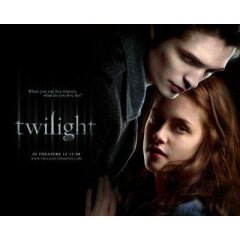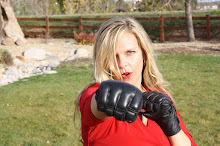
My much adored cousin told me I just HAD to read Twilight (The Twilight Saga, Book 1), by Stephenie Meyer, which is flying off the shelves as women indulge our addiction to the love story.
In the meantime, I've been contemplating a few things like why girls and women can be so self-defeating.
Why does the battered wife stay or go back?
Why are girls willing to put up with blatant disrespect for boyfriends?
Why do women and girls tend to glamorize "giving up everything" for their husbands and children?
What is wrong with us?
Women make up 50% of the population, yet we have so little of the world's power. Why?
Read Twilight (The Twilight Saga, Book 1).
Edward, the beautiful vampire tells Bella, the teenage human girl, over and over that his biggest desire is to kill her. That he can barely contain himself whenever he's around her. Her own demise only turns her on. She has zero sense of self-preservation. She "Loves" him. Within the first week of meeting Edward, who immediately treats her like crap, because he wants to harm her so badly he finds it difficult to resist, she gives up her friends, her studies, her father and her mother and all of her interests. Giving up everything is "worth it." (Where have I heard that line before mothers?)
The answer to all those questions is - we think it's romantic. It makes us hot. It makes us linger in the bathtub or passes the time quickly on the treadmill.
The self-defeat, the sacrifice, the giving up of self, is in our feminine collective dialogue and it's like crack cocaine to us.
Women are addicted to this emotional drug we call "Love", but which is really a lot more like unhealthy emotional psychosis.
It starts with the Disney Princess drama as toddlers and children.
But, then we grow up and it has no effect on us our "real life?" Right?
Then why is the Twilight Series flying off the shelves?
There's no sex in the book (because he would crush her vulnerable and breakable body). But, really, is sex the most self-distructive thing girls participate in? I think not. I would hold up "Love," and our distortions of it, as the most dangerous thing to girls' confidence, their self esteem, their sense of self, their psychological and emotional health. How many girls have sex too soon for this distortion of "Love?"
Here's the other thing that gets me about this type literary dialogue, it's so prevalent in the collective female culture. Yet, the "give up everything" theme doesn't exist in men's literature.
How many relationships have actually self-destructed with these words, "But I gave up everything for you!" women/girlfriends/wives declare.
"Who asked you to? Why would you do that?" men want to know. Love is not described in the same terms, nor defined by the need for women to give up so much of themselves that they no longer actually exist, in the literary consciousness of men.
Women keep acting out the same self-distructive communication patterns and the same self-sacrificing behaviors found in books like Twilight and men are completely bewildered by it.
The only literature or culture in which this exchange - women giving up everything - shows up is in their pornography, where women aren't featured for "LOVE" as we write it, they are featured as inanimate objects for a mere moment's pleasure.
Stop this little cultural miscommunication and you most likely increase not only the duration, but the quality, of marriage in this country.
Stop buying into this ridiculously absurd self-defeating definition of "LOVE" and we might actually give our daughters a shot at healthy love, positive and fulfilling relationships, and enduring marriages. One where they get to keep their selves, their identities, their interests, their talents, their careers, their hobbies, their sense of self-respect and their physical safety.
The question is - can we have both?
Can we have our trashy teenage romance vampire romance novel where we "pretend" to give up our choices and our well-being, our life even, our families, for the "love of our life" who wants to kill us and flat out tells us that and then live empowering strong lives?
Or, do we hardwire our brains to believe that doing self-defeating things for a man is "romantic?" If our brains are hard wired this way, are we passing that down to our daughters? Especially if we allow them to indulge in this type of culture and media?






7 comments:
We read this book in one of my book clubs. I just finished it (about two months later). I found Bella to be really annoying for these characteristics you describe, and I think the other girls in my club felt similarly. At least, I remember them discussing their annoyance and I hadn't read the book yet. And that's really the only thing about her that is annoying, plus her complete lack of self-esteem.
According to the reviews I read of books two and three, I think eventually Bella realizes some of the ramifications of giving up her human life. Especially in book 3 I think.
Rebecca
When I was young I read way too many Regency Romance novels. No sex, but the whole book was an a--hole treating the "heroine" like crap and then on the last couple of pages he figured out he loved her, they got married and lived happily ever after.
I married that man. He never figured out he loved me. I'm teaching my girls different.
Carol
Do you still participate in reading those romance novels or let your daughter's read them Carol?
No. I've tried. They drive me nuts. If I get tricked and check out a similar book at the library, after I've read the first couple of chapters I skip to the end and never read the middle.
Katrina, my 28 yr old, reads mystery or scary or scifi. We both like scifi fantasy with strong heroines, like Mercedes Lackey usually writes.
Tabitha, my 10 yr old, reads Junie B Jones and Bunnicula. She still finding her favorite genre but honestly she'd rather draw, color, or write than read. She's an artist.
No offense, but have you read the books? They're not quite like that... (Spoilers for all three books are ahead, if anybody wants a warning.)
First of all, Edward is chivalrous. He doesn't mistreat Bella. In the second book, he proves that he'd rather die than go on without her.
Second, Edward doesn't want to kill her. He needs to. He compares it to an addiction that he can't control, only he didn't do anything himself to get addicted.
And Bella doesn't give up everything for Edward. She just moved and has just a few friends, but she doesn't give them up for love. And with both Jacob and Edward in love with her, she'd be "giving one up" by making any choice. She's definitely not giving up her studies-- he's the one who wants her to go to college. (And he'll of course get her to go to several good ones several times if she's changed into a vampire.)
At least give this to Edward: he leaves, thinking it's in her best interest. Of course, it doesn't work out well, but she, along with Alice, his sister, saves him after he ends up mistakenly thinking she's committed suicide. Anyway, it's clear that she wants to be with Edward and wants to be a vampire. Is it really giving something up if you want it?
As a side note, Bella wrote an essay on Shakespeare's "misogynistic treatment of women" at one point.
Finally, the vampires in the book are all strong-- including Esme, Rosalie and Alice.
In conclusion, Twilight isn't as bad as you might think it is. There are millions of things that are way, way worse for girls.
At least look at the cover long enough to spell the author's name right; it's StephEnie Meyer, not StephAnie Meyer.
See what I mean?
Okay, I too am addicted to Twilight, but I see your point here and it's a good one.
I was in a horribly abusive relationship in highschool and it wasn't until I went through years of therapy (that I'm still in) that I learned to value myself, my body and who I am (still coming to terms w/ this at times).
I think this ALL starts w/ early early childhood. Before we can even interact we have nothing to do but observe, and that leaves a lot of time for the little minds of babies to process things for later in life.
I personally do not believe that enough parents/care takers value the importance of the very first year of life for their child(ren). They think the baby doesn't understand so they don't watch how they speak to each other until the baby starts talking. But in those first years the baby has already absorbed so much that cannot be reversed.
Post a Comment